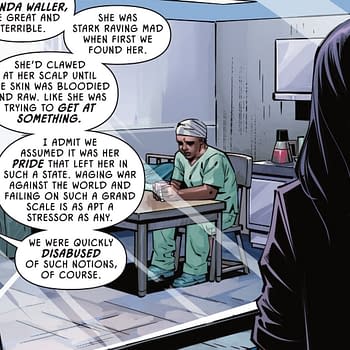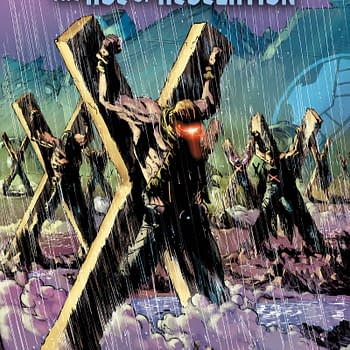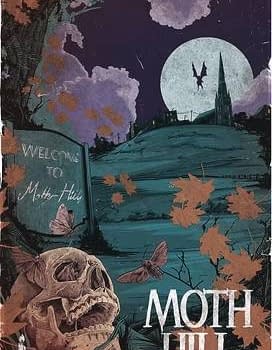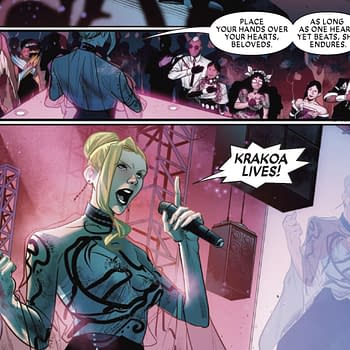Posted in: Comics, Recent Updates | Tagged: Art Spiegelman, Blankets, captain america, Comics, comixology, Craig Thompson, digital comics, education, entertainment, frank miller, higher education, iron man, jack kirby, Maus, will eisner, x-men
Getting The Kids To Read Comics – Findings From A 'Great Experiment' In The Classroom
Brian M. Puaca writes for Bleeding Cool:
As we move into the last half of May, college students around the country are graduating or heading home for the summer. For many faculty, the end of the semester means taking stock of the past year's work and revising courses for the future. Now that our semester is over, I have had the chance to reflect on a new course that I just finished teaching for the first time: the history of comic books and American society. In grading final papers, reviewing course evaluations, and speaking with students outside of class, I have garnered several insights about young people and comics. I'm pleased to report that the views I held in January about these young men and women and their interest in comics might have been overly pessimistic.
The course itself, or the "great experiment" as I often referred to it in class, was designed to teach students the skills of the historian through our study of comic books. The comics we read, along with other relevant documents such as creator interviews, contemporary press coverage, Congressional testimony, and memoirs, served as primary sources for our analysis. Students read a variety of different genres of comics from superheroes to romance to crime and considered the relationship between these publications and the society that created – and consumed – them. Comic books, therefore, became our vehicle for talking about politics, education, sexuality, gender roles, labor relations, religion, anti-Semitism, racism, environmentalism, technology, and even business strategy.

And so what did I learn from these students over the course of our four months together? What nuggets of wisdom could I surmise from their work, discussions, and comments? Well, here are a few observations that I hope hold true for others in their age group in regard to how they relate to comics:
1. They are familiar with a wide array of comic characters.
For a class of students that sheepishly admitted they did not have a lot of experience with the comics medium, they arrived on the first day with a rather impressive knowledge of characters and continuity. This fact speaks to the increasing ubiquity of comics in American life. From toys to clothing to commercials, these students had run into dozens of characters (if not more) before ever arriving in my class. That's not to say the students knew the names Will Eisner, Jack Kirby, or Frank Miller, but they already had encountered many of the characters these creators had worked on.
2. Their knowledge of comics comes largely from the film industry.

3. Many of them had never been exposed to comics.
When I asked them the obvious question as to why they had never read the comics starring these characters if they enjoyed the films so much, they didn't have an answer. One noted that it had never occurred to him to read the comic. Several nodded in agreement. Another said that he didn't know where to get comics in his hometown. The ones who had read comics before coming to the class – for most of them it was earlier in their childhood – almost always mentioned their parents as the spark for their interest. "My dad read comics as a kid and shared them with me," explained one of my few comics veterans.
4. It's not all about superheroes.

5. They prefer digital comics.

In news that is unlikely to shock anyone, these students almost universally preferred digital comics to print. They raved about the ease with which they could locate, purchase, and download comics on Comixology. They found the prices appealing and appreciated the portability of the books they had purchased. They also talked about the convenience of having comics available wherever they were at all times. Print comics, one asserted, would soon appeal only to collectors or dinosaurs (like me!) who were nostalgic for the past.
6. They love the medium and want to continue reading.
Perhaps the most positive development that I noticed by the end of the semester was the sincere passion for comics that had been sparked in many students. Students would often come to office hours to chat about the readings and – more notably – other things that they had picked up outside of class assignments. What I found particularly noteworthy is that these students came to comics not as collectors or speculators but as readers. They didn't care about bags and boards, variant covers, or gimmicks. (Incidentally, they laughed quite hard when I told them the story of the day I shelled out $3.50 to buy two copies of the glow-in-the-dark Ghost Rider #15 because I knew – knew! – that it was going to make me rich someday.) These students cared about the story and wanted to be entertained.
Student feedback further reinforced my impression that the course had made a deep impact on many of them. On the course evaluations, one said, "I found myself wanting to do the readings." Another wrote, "I am going to continue to read comics after this course." Not one course review complained about the readings, griped about the comics medium, or denigrated the value of the material as a way to explore American society in the twentieth century. I've already spoken to some of them about things they might enjoy reading over the summer. And I'm pleased to say that some of them have shared their recommendations with me about things I need to check out before I teach the class again.
And so in closing, I must say that the class was a tremendous joy to teach and one that I think the students found rewarding. They sharpened their critical analysis skills through their interrogation of sources, and they improved their writing abilities through the many assignments they completed for the class. Moreover, they came to understand, appreciate, and enjoy the medium of comics. For a group of fifty students, most of whom had no interest in comics at the start of the year, this is no small feat.
As I mentioned to my class in the opening week of the semester, the average age of the comic book reader is around forty years old. The average, I noted, also increases a little bit every year. And yet it doesn't seem to me that the constant drift toward fifty needs to continue. As I see it, the take-home lesson from the class in regard to audience and readership was a simple one: it's wrong to think that young people don't like comics. From what I saw this semester, they don't really know comics. Most of them don't have any personal experience with comics. They know characters, see movies, and play video games. But they haven't read comics. And what makes me all the more optimistic is that when they do read comics, they love them! Here's to converting some new comics readers next year!
[Note: The Digital Comic Museum is a wonderful resource for those interested in the earliest decades of comics. The website contains a treasure trove of comics from publishers like Charlton, Dell, and Lev Gleason, to name only a few. Free registration is required to view the comics. The website address is: http://digitalcomicmuseum.com/.]
Brian M. Puaca is an associate professor of history at Christopher Newport University in Newport News, Virginia, where he teaches a course on the history of comic books and American society. He can be reached at bpuaca@cnu.edu.















